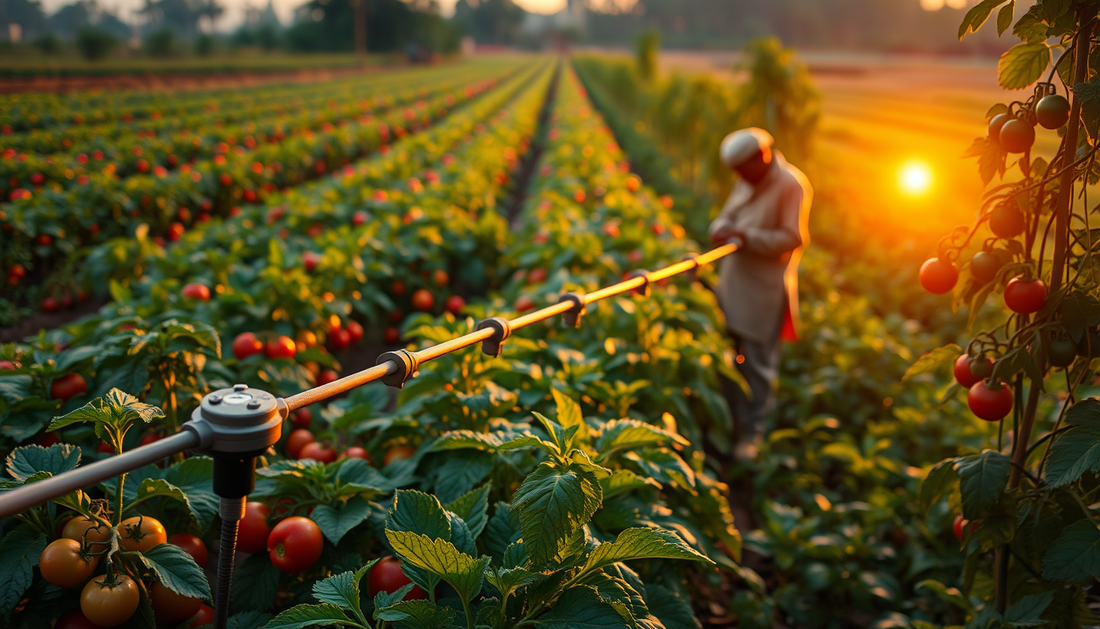
Optimizing Watering Systems for Thriving Bangalore Vegetable Gardens
As the sun beats down on the bustling city of Bangalore, gardeners and urban farmers face a unique challenge - how to keep their vegetable patches lush and productive in the face of limited water resources. In this comprehensive guide, we'll explore the best watering systems and techniques to help your Bangalore garden thrive, while conserving precious water.
Understanding Bangalore's Unique Climate
Bangalore, often referred to as the "Garden City of India," enjoys a pleasant, subtropical climate. However, the city's rapid urbanization and changing weather patterns have led to increasingly erratic rainfall and extended dry spells. This makes it crucial for gardeners to adopt water-efficient irrigation strategies to ensure the health and vitality of their vegetable crops.
Rainfall Patterns in Bangalore
Bangalore typically experiences two distinct rainy seasons - the southwest monsoon from June to September, and the northeast monsoon from October to December. The average annual rainfall in the city is around 970 millimeters (38 inches), with the majority of precipitation occurring during the monsoon months. However, in recent years, the rainfall patterns have become more unpredictable, with some seasons experiencing severe droughts and others witnessing intense, localized downpours.
Soil Characteristics in Bangalore
The soil in Bangalore is predominantly red, lateritic, and well-drained, with a slightly acidic pH. This soil type is suitable for a wide range of vegetable crops, but it also means that it can dry out quickly, especially during the hot, dry months. Gardeners need to be mindful of the soil's water-holding capacity and adjust their watering practices accordingly.
Selecting the Right Watering System
When it comes to maintaining a thriving vegetable garden in Bangalore, the choice of watering system can make all the difference. Let's explore some of the most effective options:
Drip Irrigation Systems
Drip irrigation is widely regarded as the most efficient watering method for Bangalore's vegetable gardens. These systems deliver water directly to the root zone of plants, minimizing evaporation and ensuring that every drop is utilized effectively. Drip systems can be easily installed in raised beds, container gardens, and traditional in-ground plots, making them a versatile choice for urban gardeners.
Benefits of Drip Irrigation
- Reduced water consumption: Drip systems can save up to 70% of the water used in traditional sprinkler or hose-based watering.
- Targeted water delivery: Water is applied directly to the plant's roots, reducing waste and ensuring optimal moisture levels.
- Improved plant health: Consistent, controlled watering promotes strong root development and reduces the risk of disease and pest infestations.
- Reduced weed growth: Drip systems deliver water only to the desired plants, minimizing the growth of unwanted weeds.
Rainwater Harvesting Systems
In a city like Bangalore, where water scarcity is a growing concern, rainwater harvesting can be a game-changer for vegetable gardeners. By capturing and storing rainwater during the monsoon season, gardeners can create a reliable water source for their gardens during the drier months.
Benefits of Rainwater Harvesting
- Water conservation: Rainwater harvesting reduces the demand on the city's limited water supply, making it a sustainable solution for gardeners.
- Improved water quality: Rainwater is generally free of the minerals and contaminants found in groundwater or municipal supplies, providing healthier water for plants.
- Cost savings: Utilizing harvested rainwater can significantly reduce the need for purchasing water, leading to long-term cost savings for gardeners.
- Reduced soil erosion: Rainwater harvesting systems help to slow down the flow of water, preventing soil erosion and nutrient loss in the garden.
Raised Bed Gardening with Drip Irrigation
Combining the benefits of raised bed gardening and drip irrigation can be a highly effective strategy for Bangalore's vegetable growers. Raised beds improve soil drainage, aeration, and nutrient retention, while the drip irrigation system ensures efficient water delivery to the plant roots.
Advantages of Raised Bed Gardening with Drip Irrigation
- Enhanced water efficiency: The raised bed design, coupled with the targeted watering of drip irrigation, minimizes water waste and evaporation.
- Improved soil health: The elevated beds promote better root growth and allow for the incorporation of nutrient-rich organic matter.
- Easier maintenance: Raised beds and drip systems require less bending and stooping, making gardening tasks more accessible and comfortable.
- Reduced weed growth: The combination of raised beds and drip irrigation creates an environment that is less favorable for weed germination and proliferation.
Water Conservation Strategies for Bangalore Vegetable Gardens
In addition to selecting the right watering system, there are several other techniques gardeners can employ to conserve water and ensure the long-term sustainability of their Bangalore vegetable gardens:
Mulching
Applying a layer of organic mulch, such as shredded leaves, straw, or wood chips, around the base of plants can significantly reduce evaporation from the soil surface. This helps to retain moisture and minimize the frequency of watering.
Soil Amendments
Incorporating compost, vermicompost, or other organic matter into the soil can improve its water-holding capacity, allowing plants to access moisture more efficiently and reducing the need for frequent watering.
Crop Selection
Choosing vegetable varieties that are well-suited to Bangalore's climate and require less water can be a strategic way to conserve resources. Some drought-tolerant options include tomatoes, peppers, eggplants, and certain leafy greens.
Watering Schedules
Establishing a consistent watering schedule, with a focus on deep, infrequent watering, can help to maintain optimal soil moisture levels and promote deep root growth in vegetable plants.
Monitoring and Adjusting
Regularly monitoring soil moisture levels and adjusting watering practices accordingly is crucial for efficient water use. Gardeners can use soil moisture sensors or simply observe the plants' appearance to determine when irrigation is needed.
Conclusion
By embracing water-efficient watering systems, such as drip irrigation and rainwater harvesting, and implementing strategic water conservation techniques, Bangalore's vegetable gardeners can create thriving, sustainable gardens that thrive even in the face of limited water resources. With a little planning and dedication, urban farmers in Bangalore can enjoy bountiful harvests while contributing to the city's long-term water security.







No comments